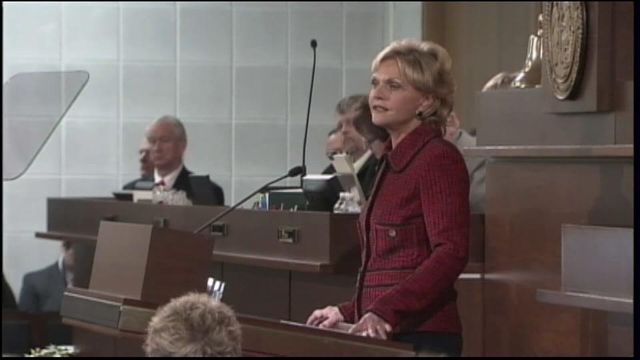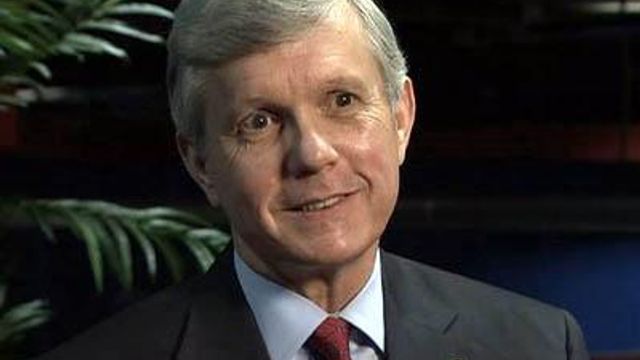Dalton, Faison to join gubernatorial fray
Democratic Rep. Bill Faison of Orange County has planned a press conference Saturday morning, where he will become the second man to throw his hat in the ring for the governor's office, just three days after sitting Gov. Bev Perdue said she would not run for re-election.
Perdue's surprise announcement sent Democratic elected officials, former officials and ex-candidates scrambling to crunch the numbers to see if they've got the money, name recognition and message to win a primary that's just 100 days away.
Decisions have to be lightning fast. Candidate filing begins Feb. 13.
"It's two weeks from the filing and people had no expectations that they would be looking for a candidate for governor," Dennis Wicker, the lieutenant governor from 1993 to 2001, said Friday. "I think it caught more people off guard."
North Carolina has never had an incumbent governor choose not to run since voters gave candidates the choice 35 years ago, so handicapping the race is tricky.
Faison is the second high-profile candidate to join the fray. At least a half-dozen other Democrats have said publicly they're considering the idea. If no one gets more than 40 percent of the vote in the May 8 primary, the top two vote-getters will advance to a runoff in late June.
"It's wide open. That's the way it's perceived," said David McLennan, a political science professor at William Peace University in Raleigh.
Lt. Gov. Walter Dalton put out a statement within hours of Perdue's announcement saying he was in. Faison is expected to make the same decision Saturday morning.
As early as November, Faison spoke out against the governor, saying he was confident she would "do the right thing and step aside." Earlier this month, he loaned his campaign $500,000.
Dalton pointed out that he's won statewide office before, a direct contrast to Republican nominee Pat McCrory, who lost to Perdue in 2008.
"Our strategy is much the same: Get around. Listen to the people," he said, adding that the short time before the primary "certainly amplifies" his schedule.
A Rutherford County attorney and former state senator, he said he shares Perdue's goal of raising the state sales tax rate by three-quarters of a cent to generate more money for public schools.
"I am my own person. I have my own agenda. I like my agenda of funding education and putting teachers back to work," he said.
State Rep. Bill Faison, D-Orange, who had been aggravating Perdue supporters by suggesting for months she wouldn't run, said no one should be surprised by what he'll say soon. Sources told WRAL News that he plans to declare his candidacy in Greensboro on Saturday night at the Sanford Hunt Frye Dinner, a major fundraiser for the North Carolina Democratic Party.
While Faison hasn't won statewide office – he lost last year in a bid for state Democratic Party chairman – he has money. He said earlier this month he planned to loan his campaign committee $500,000 in personal funds.
Dalton had $590,000 in the bank as of Dec. 31. He had a Wednesday night event that raised about $150,000, his campaign said.
Having ready to access to money will give the pair and other independent wealthy candidates the ability to run television ads quickly and boost their name recognition, Democratic consultant Brad Crone said.
But money won't be enough in a statewide race that could get cantankerous as May approaches. The winning candidate probably will need to raise a few million dollars and have an array of dedicated supporters across the state, not just in urban areas.
"It's both a sprint and a marathon," Dalton said.
People who are considering a bid need to understand the difficulty of competing in such a large state, said Hampton Dellinger of Durham, who finished second to Dalton in the Democratic primary for lieutenant governor in 2008.
"It's hard to build a statewide network in two years, much less two months," Dellinger said. "Murphy and Manteo are not close. I've been to both."
Both Dalton and Faison have potential weaknesses. Neither candidate is particularly well known. Dalton is considered conservative on social issues – as a state senator he co-sponsored in 2005 a bill to put a proposed constitutional amendment to ban gay marriage on the ballot – which may give him trouble with voters in the party's more liberal bloc. Faison's style doesn't sit well with some party members, and court filings detailing a marriage that ended in divorce in 2010 could give opponents fodder.
McLennan said Democrats might be better served by finding someone new to carry the party's banner in the gubernatorial race.
"If I was designing the perfect candidate, (I'd look for) a younger, newer voice that has a new message that can both stand up to the General Assembly but also sort of position North Carolina differently," he said.
Dalton countered that he could be that fresh face.
"I've never run for governor before, that's for sure, and although I'm lieutenant governor, I doubt many people know who I am," he said. "I (have) a proven record in moving the state forward in things like community colleges."
Tom Jensen of Democratic-leaning Public Policy Polling said Dalton is a strong campaigner, but he still trails McCrory by double digits.
A PPP survey from October put former University of North Carolina President Erskine Bowles dead even against McCrory.
"He's a lot stronger with white voters than Gov. Perdue was, and he's a lot stronger with independent voters that Perdue was," Jensen said of Bowles, who vowed not to run another campaign after twice losing in U.S. Senate bids.
Polling isn't in yet for Charlotte Mayor Anthony Foxx, who succeeded McCrory. Democratic consultant Joe Sinsheimer said he sees real potential in Foxx.
"He doesn't come out of the same pond as the rest of the candidates do. He doesn't come out of the General Assembly. He would have a significant advantage of having the Charlotte media market to himself," Sinsheimer said. "At this point, it's a 14-week scramble, and it's going to be fun."
Here's a quick look at other Democrats who have said they're considering a run:
RICHARD MOORE: The 51-year-old former state treasurer has won statewide office twice and can provide some self-financing to his campaign. But he lost badly to Perdue in the 2008 Democratic gubernatorial primary in which some criticized his tactics. He has been keeping a low profile in state Democratic politics ever since.
FOXX: The Charlotte mayor is a fresh face in state politics, has won convincingly in a city that McCrory needs to do well in order to win and has close connections to President Barack Obama. Foxx, who is black, also could help bring out the Democratic vote in the general election. But it might be the wrong time for Foxx to take on such a bid when the Democratic National Convention comes to Charlotte in September.
BOB ETHERIDGE: The former seven-term congressman from Harnett County could re-assemble a statewide network that got him elected state schools superintendent twice. His age (70) and his 2010 congressional defeat — assisted by a viral video showing him grabbing a man who was taping him on a Washington street — could raise questions about electability.
MIKE MCINTYRE AND BRAD MILLER: Both are Democratic incumbents in Congress whose re-election bids have been harmed by redistricting. McIntyre would attract conservative Democrats while Miller would get help from liberal enclaves. But they'd have to persuade voters that running for governor isn't a consolation prize. U.S. Rep. Heath Shuler also fits in this category.
ALLEN JOINES: The Winston-Salem mayor would seem a long shot but has been involved in statewide politics and has ties to Perdue.
WILDCARD: Bowles is a former U.S. Senate candidate, White House chief of staff and president of the University of North Carolina system who is being urged by many Democrats to get into the race but has said nothing publicly. He's received bipartisan praise as UNC president and leading a bipartisan commission that studied the federal debt. He knows how to run statewide but lost in 2002 and 2004 and has eschewed other political bids.











